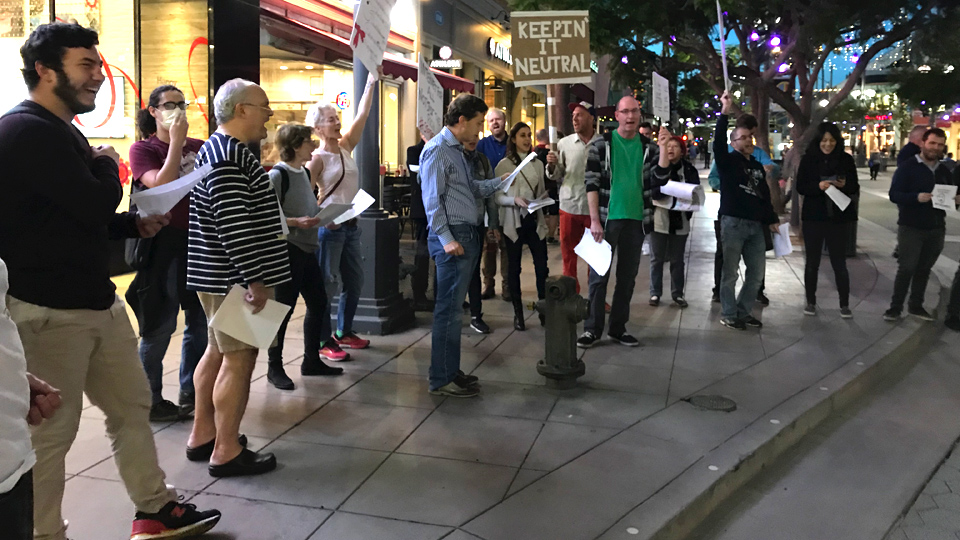
SANTA MONICA, Calif. — A gathering of about 30 vocal and angry protesters of all ages in front of the Verizon store on the Third Street Promenade in Santa Monica Thursday night spoke out against impending repeal of net neutrality by the Federal Communications Commission (FCC).
Trump’s newly appointed head of the FCC, Ajit Pai, is a former lawyer for Verizon, one of the many internet giants that have called for less regulation, opening the doors to more profit and less consumer friendliness. The end of net neutrality will spell extra charges, reduced competition, blocked access, slower connection speeds for disfavored sites, and censorship. One protester foresaw “a charge for every click.”
The nationally coordinated demonstrations Thursday targeted some 700 Verizon stores in all 50 states, not because Verizon is particularly more egregious than other providers, but principally to call Pai’s attention—and the public’s—to the closely interlocking relationship between government and big corporations. So much for “draining the swamp!” The composition of the FCC is now 3 Republicans and 2 Democrats. The expectation is that with their vote on December 14, net neutrality will be gone.
Net neutrality is the First Amendment of the internet.
“I’m afraid that if people can’t speak freely, it does not bode well for the human race,” said Greg, one of the first of the protesters to appear at the site.
His friend Leigh chimed in: “Pretty soon we’re only going to be able to get the information the Executive Branch wants us to get.” In other words, a lot more “fake news” could be coming down the internet highway.
Greg continued, “The freedoms we have won were hard-fought, and if we don’t protest, then they’ll disappear.”
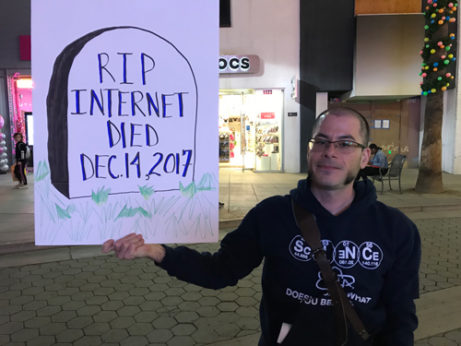
Peter, a television writer and producer, mentioned that on the way to the demonstration he learned that so far an estimated 600,000 pro-net neutrality activists had shown up at Verizon stores around around the country. There were dozens of Verizon sites just in the Los Angeles area alone.
By then, the crowd had started to thicken, as a fast-stepping contingent approached from down the street. One man had a prompt sheet and started to lead the chants:
“The people, connected, will never be defeated,” which the crowd picked up and repeated two or three times, until it morphed back into its original form, “The people united….”
Many of the chants echoed the style and demands of generations of protest in the United States. One went: “Verizon, Comcast, A T T, you can’t stop net neutrality.”
Other chants, using the “people’s mike” system of call and response, left the rhyming behind and got straight to the point: “We cannot become enslaved by corporate greed.”
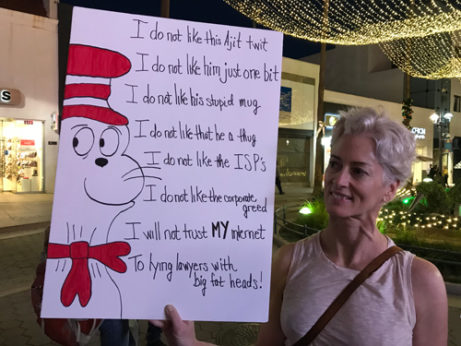
A woman in the group spoke up: “New ideas won’t get a chance to rise because of monopolization.”
The chanting continued: “Pai, Pai, you can’t hide. We can see your corporate side.” And the familiar standby: “Hey hey, ho ho, Ajit Pai has got to go.”
Among the chants, my favorite was this one: “L O L, O M G, We want net neutrality.”
Some of the signs were cute, too. This one could gain some currency: “Hey Verizon, Go FCC Yourself.”
Already, said one protester who has worked in the high-tech industry all his adult life, our internet is severely compromised in ways we are not even aware of. If two people click on the same New York Times story, for example, they may not see the same things. The surrounding ads and pitches are geared to the specific internet user according to locale, purchasing history, political views, and anticipated expectation of response. In some ways, the algorithms of the internet marketplace know you better than you know yourself.
Jeff Duck came with a prepared statement which he read off his iPhone. He gave People’s World permission to publish it:
“Before 2015, all of the companies that gave you the internet had legal authority to dictate the speed of any website. This wasn’t a problem until they started slowing down websites like Netflix for various reasons, which is a valid action—there’s only a limited amount of bandwidth available, so why should Netflix be allowed to take most of it?
“Netflix takes so much data only because we CHOSE to use it so much, so this mentality was able to help the FCC give the internet a special classification of Title II, which basically stopped service providers from being able to slow down websites.
“Now, with our shift in government, providers see an opening in which they can once again regain full control of the wires they have in place. Their incentives are valid—their overall revenue has dipped 5 percent since 2015, but obviously regulation can decrease profits. Car companies could make more money if there were no emission standards, oil companies could do real well drilling in Yellowstone, and cigarette companies would make a KILLING if they could give free samples to middle schools. We put rules in place to ensure that we don’t ruin our future, and if we let Internet Service Providers dictate the path of our greatest communication platform while still in its infancy, then we could be dooming ourselves in this digital age.
“I say ‘could’ because it’s entirely unknown what will exactly happen to our internet. For all we know, creating a freer market like this could benefit everyone if it leads providers to create more infrastructure and faster internet. However, with so little competition, the risk of limiting our access to such a wealth of information is too large to gamble. One potential consequence could involve websites paying more to be fast which could devastate smaller websites. Because let’s be honest: We’re going to use whatever is fastest.
“The Internet is beautiful because anyone can have an idea, post it online, and make it accessible to everyone. By raising the entry barrier, we will stifle our own innovation, and ultimately our overall quality of life. The more voices and ideas that are generated and heard, the better off we will be as a society. On the Internet, a Fortune 500 CEO can have a conversation with a homeless meth addict without either party being the wiser. This free flow of information enables a rich and diverse exchange of ideas not possible on any other platform. Decreasing our immediate access to most of the world’s knowledge will only increase our pointless divisions as a nation.”
Thank you, Jeff.
Make calls. Attend a local event. Time is running out.
- Call the FCC directly: (202) 418-1000 or 1-888-CALL FCC (225-5322).
- Take action: battleforthenet.com.
- Volunteer: battleforthenet.com/jointeaminternet.
- Contact Ajit Pai, chair of the FCC.
- Contact your members of Congress.



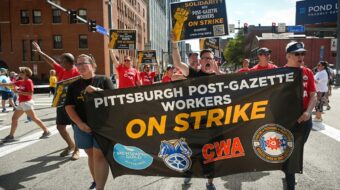
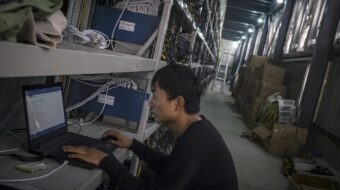
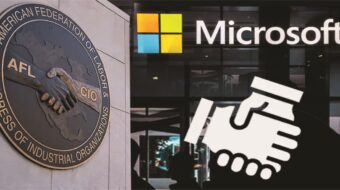






Comments